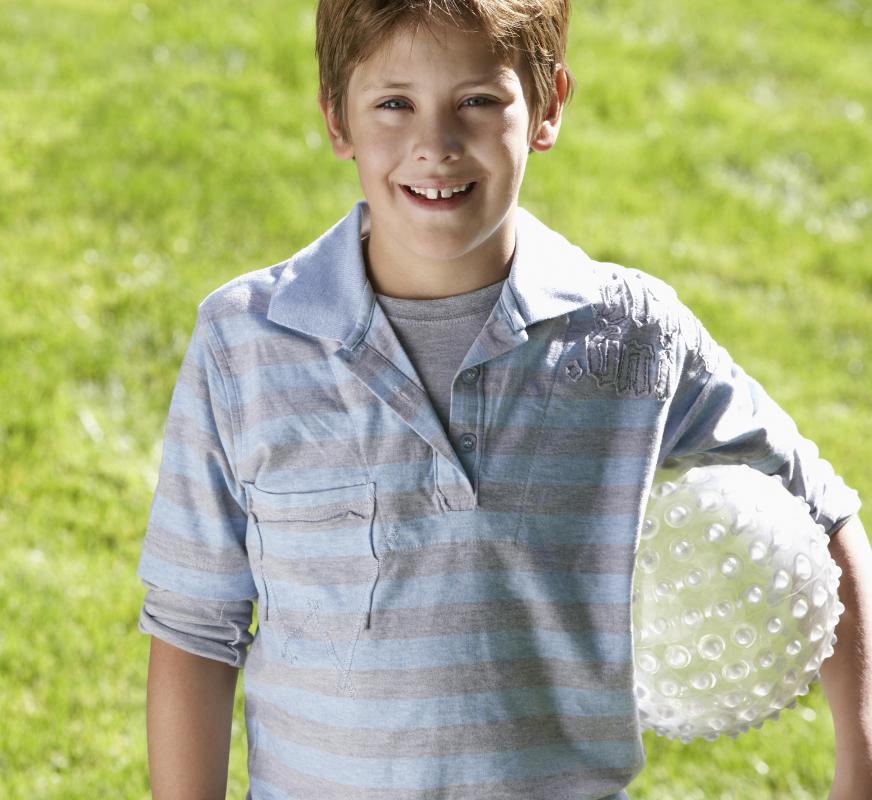At WiseGEEK, we're committed to delivering accurate, trustworthy information. Our expert-authored content is rigorously fact-checked and sourced from credible authorities. Discover how we uphold the highest standards in providing you with reliable knowledge.
How can I Teach my Child to be a Good Sport?
Teaching a child to be a good sport and exhibit good sportsmanship can begin early. Even before children are old enough to play games, they may observe their parents watching and/or participating in sports. Parents are thus given the opportunity to be a good sport themselves, and model for their children the types of behavior they would like them to learn.
A few simple rules apply to both the sports fan and/or participant. If you’re watching a baseball game, perhaps, with a young child, avoid screaming or shouting at the players, or the TV set. You can make the occasional critical comment, but it should be critically constructive. Screaming or shouting makes even a young child aware that “winning” and not “playing” is the objective. They can also learn early on that their parents seem to place a high value on winning and internalize this, becoming competitive to a fault later in life.

Instead, if a favorite team loses, emphasize your enjoyment of the game. Be a good sport by praising players on the opposing team if they played well and making good comments about players on the losing team for making good plays. These can help show that a single sporting event is not merely an opportunity to win, but to play well. Even one good play is worth praise.
When children can learn basic card games, continue to model “good sport” mentality. If you have several children, don’t institute a “loser cleans up” rule. Instead either clean up the game together as a family, or have a “winner cleans up” rule.

Be patient with young children who seem extremely competitive. If they cry or get mad when a board or card game is not going their way, it may be time to end the game. A situation where they always lose may not be much of a teaching experience either. If you’re playing games like checkers, you may occasionally want to make a few unwise moves so your child has a chance to win. Praise the child when he wins, and praise him when he loses gracefully. Try to remember a move or two that was really smart or impressive.

As children move into the arena of competitive athletic sports, be certain you keep your cool. Never shout at your child. Clap politely for good plays by the other team. If you have a disagreement with a coach’s decision or a referee call, don’t confront the coach in front of your child. Pick a time after the game.
If you note a coach encouraging your child to behave in ways that are not “good sport” approved, put a stop to it after a game. Even if a coach reprimands your child, a little talk after a game can let your child know that your greatest expectation of them is to play a sport with good manners, and that good sport behavior is more important than winning or losing.

Also put a stop to criticism of other players, preferably right away. If you hear your child make disparaging comments about another kid’s performance, remind them that’s not good sport behavior. As children become more sophisticated, they can also learn that some criticism is good, when it can be used constructively. Ask a child what thing she would have liked to improve in a game, and what thing she was proud of.

If a child can’t be a good sport, and frequently is critical of others, it may be time to take him or her out of the competitive field for a while. Participation in a sport should be a privilege and an honor. A child who repeatedly violates good sport rules may not have earned the privilege of playing. Sitting a season out may be more important in the long run, than allowing a child to foster bad habits that may last a lifetime.
AS FEATURED ON:
AS FEATURED ON:















Discussion Comments
I know some Little League parents who really need to read and memorize this article!
I have been to sporting events where I have seen grown people act in ways that would embarrass a five year old. There are some people for whom winning is the only acceptable outcome, period. Therefore, when they are not winning, or their team is not winning, they are having conniption fits.
Then, they wonder why their child's teacher wants to have a conference about why no one wants to play with little Johnny because he's such an ungracious winner and such a sore loser.
Post your comments